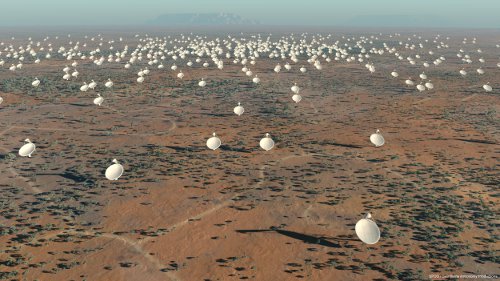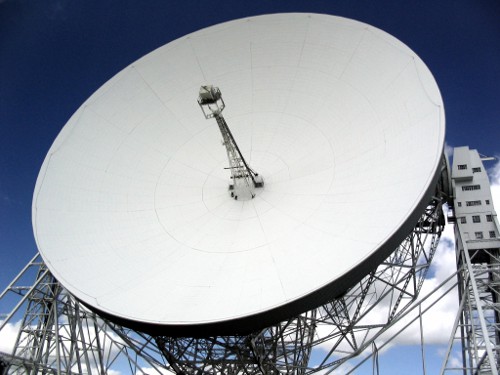Getting ready for the world’s biggest ever telescope
2 April 2011

Artist's impression of some of the dishes in the proposed Square Kilometre Array.
Image Credit: SPDO/Swinburne Astronomy Productions

The Lovell Telescope at Jodrell Bank Observatory.
Image Credit: Anthony Holloway, University of Manchester.
Plans for the world’s biggest telescope – the Square Kilometre Array- advanced significantly today with a decision to locate the project office at The University of Manchester's Jodrell Bank Observatory. There has also been support from the partners, including the United Kingdom, for the next phase of the project, and the first steps towards creating the legal entity needed to deliver this ambitious global project.
The Square Kilometre Array (SKA) is a 1.5 billion Euro multinational science project to build the world’s largest and most sensitive radio telescope. The SKA will be capable of answering some of the most fundamental questions about the Universe – including helping to understand dark energy, general relativity in extreme conditions and how the Universe came to the look the way it does now.
The SKA will be an array of radio antennas with a collection area of a square kilometre with its core in South Africa or Australia. Signals from individual antennas will be combined to form one giant telescope. In the same way, the famous Lovell Telescope at the University of Manchester’s Jodrell Bank Observatory is used with other UK telescopes (the e-MERLIN network) and as part of an international network. With an antenna at Chilbolton, the UK is also part of LOFAR a low-frequency network centred in the Netherlands. SKA builds on this technique and tradition of collaboration, bringing together all the major groups in radio astronomy.
Professor Dame Jocelyn Bell Burnell, prominent radio astronomer and President of the Institute of Physics, said,
"Since the 1950s, radio astronomy has provided scientific pioneers with tools to revolutionise our understanding of the Universe. The power of this new telescope project however is going to surpass anything we've seen before, enabling us to see many more radio-emitting stars and galaxies and pulling the curtains wide open on parts of the great beyond that radio astronomers like me have only ever dreamt of exploring. The Square Kilometre Array heralds in a post-Einstein era of physics that will help us take huge strides in our attempt to understand the most bizarre objects and the darkest ages of the Universe."
UK home to the SKA Project Office
Minister for Universities and Science, David Willetts, said:
"The Square Kilometre Array is a project of global significance. This is evidence of the high reputation of Britain's management of international science projects. It is great news for Britain and for Jodrell Bank and Manchester University in particular."
The UK has hosted the SKA Programme Development Office at The University of Manchester in recent years. We now look forward to the move of the SKA Programme Office from the Manchester campus to the University’s Jodrell Bank Observatory. Jodrell Bank is a most fitting home for the scientists and engineers who will shape the SKA. Locating the project office here will not just be a good outcome for the UK; it will strengthen the SKA project itself by bringing together a rich combination of innovation and experience in radio astronomy. The SKA Programme Office activity will complement the UK SKA effort built up in the Universities of Cambridge, Manchester and Oxford and extending into wider industrial and academic communities.
Professor John Womersley, STFC’s Director of Science Programmes, who was today elected as chair of the SKA Founding Board, said:
“It is great to see such significant progress being made towards building the SKA, one of our highest priorities in astronomy. The universities of Cambridge, Oxford and Manchester have a great heritage in astronomy and they are working together in SKA to ensure the UK takes a leading role in this exciting global project to better understand the universe we live in."
Professor Stephen Watts, Head, School of Physics and Astronomy, University of Manchester said
"Jodrell Bank is an ideal place for scientists and engineers to work together to plan the world's largest radio telescope, alongside world-leading radio astronomy facilities, and the new Discovery Centre. Together these offer a real opportunity to inspire people of all ages with this ambitious project to answer truly fundamental questions about the nature of the universe."
Professor Richard Schilizzi, Director of the SKA, says:
“The move to Jodrell Bank comes at a crucial time as the project grows from a concept to an international megascience project. The new location and facilities will support the significant expansion that is planned.”
Agreeing international partnership
The SKA has been agreed as a top priority project for astronomy both in the UK and across Europe. It is a very significant step that partners have started the process to fund and create a legal structure for the SKA. The UK, through the Science and Technology Facilities Council, is expecting to invest of the order of 15 Million pounds in the next phase of the SKA.
In addition to the immense scientific progress that will be made by the SKA, the project is expected to have wider benefits in continuing its already impressive involvement with industrial partners and continuing the inspiration of the public through astronomy, as Jodrell Bank has for many years.
The SKA project will drive technology development in antennas, signal transport, signal processing, and software and computing. Spin off innovations in these areas will benefit other systems that process large volumes of data. The design, construction and operation of the SKA has the potential to impact skills development in science, engineering and in associated industries not only in the host countries but in all project partners.
Note for editors:
Images of the SKA can be found at the SKA Flickr page or the SKA Telescope website.
Images of Jodrell Bank can be found at the Jodrell Bank website.
For more information please contact
Karen Lee
STFC Duty Press Officer
Mobile: 07825 125326
Karen.lee@stfc.ac.uk
Jo Bowler
Outreach Officer
SKA Program Development Office
Tel: +44 (0)161 275 4130
E-mail: bowler@skatelescope.org
www.skatelescope.org
Professor Simon Garrington
Director MERLIN/VLBI National Facility
Jodrell Bank Observatory
stg@jb.man.ac.uk
Mobile: 07976 400667
Professor Steve Rawlings
Chair of the European SKA Consortium
sr@astro.ox.ac.uk
Mobile: 07595635623
Dr Tim O'Brien
Reader in Astrophysics
Jodrell Bank Observatory
tim.obrien@manchester.ac.uk
Background
The UK SKA consortium is: University of Manchester, Oxford and Cambridge and the Science and Technology Facilities Council.
The SKA project announcement is also available. This provides more details on the funding agreement and project office.
For an overview of the SKA, also see the STFC SKA summary.
The UK has earmarked 15 million pounds of capital investment for radio astronomy through the sale of Channel 38 of the radio spectrum.
The UK has led a European consortium in developing the project from its inception, with support from the European Union Framework programme.
About the SKA
The Square Kilometre Array will be the world’s largest and most sensitive radio telescope. The total collecting area will be approximately one square kilometre giving 50 times the sensitivity, and 10,000 times the survey speed, of the best current-day telescopes. With thousands of receptors extending out to distances of 3,000 km from the centre of the telescope, the SKA will address fundamental unanswered questions about our Universe including how the first stars and galaxies formed after the Big Bang, how galaxies have evolved since then, the role of magnetism in the cosmos, the nature of gravity, and the search for life beyond Earth. More than 70 institutes in 20 countries, together with industry partners, are participating in the scientific and technical design of the SKA telescope which will be located in either Australia – New Zealand or Southern Africa extending to the Indian Ocean Islands. The target construction cost is 1,500 million Euro and construction could start as early as 2016.
Science and Technology Facilities Council
The Science and Technology Facilities Council ensures the UK retains its leading place on the world stage by delivering world-class science; accessing and hosting international facilities; developing innovative technologies; and increasing the socio-economic impact of its research through effective knowledge exchange partnerships.
The Council has a broad science portfolio including Astronomy, Particle Physics, Particle Astrophysics, Nuclear Physics, Space Science, Synchrotron Radiation, Neutron Sources and High Power Lasers. In addition the Council manages and operates three internationally renowned laboratories: The Rutherford Appleton Laboratory, Oxfordshire; The Daresbury Laboratory, Cheshire; The UK Astronomy Technology Centre, Edinburgh.
The Council gives researchers access to world-class facilities and funds the UK membership of international bodies such as the European Laboratory for Particle Physics (CERN), the Institute Laue Langevin (ILL), European Synchrotron Radiation Facility (ESRF), the European Southern Observatory (ESO) and the European Space Agency (ESA). It also contributes money for the UK telescopes overseas on La Palma, Hawaii, Chile, and the MERLIN/VLBI National Facility, which includes the Lovell Telescope at Jodrell Bank Observatory.
Jodrell Bank Observatory
Jodrell Bank Observatory (JBO) is part of the University of Manchester's School of Physics and Astronomy. Scientists and engineers at Jodrell Bank are world leaders in radio astronomy-related research and technology development.
JBO hosts e-MERLIN, the UK’s national radio astronomy facility, on behalf of the Science & Technology Facilities Council (STFC). The e-MERLIN array of seven radio telescopes (including the iconic 76-metre Lovell Telescope at Jodrell Bank Observatory) stretches 217 km across England from Jodrell to Cambridge. Recently installed optical fibre links have made e-MERLIN one of the first of the world’s next generation of ultra-sensitive telescopes and a precursor to the Square Kilometre Array.
The research programme at the Jodrell Bank Centre for Astrophysics which includes JBO, ranges from the discovery of planets orbiting other stars to the study of the origin of the Universe in the Big Bang. The Jodrell group are also working on SKA science, pulsars in particular, and technological developments in antennas, data transport, synchronisation and digital signal processing.
Recognising its pioneering work in radio astronomy and its contribution to revolutionising our view of the Universe, Jodrell Bank Observatory was recently included on the UK Tentative List for World Heritage Site status.
The observatory is also developing a new Discovery Centre designed to showcase its research work. Funded by the Northwest Development Agency, the European Regional Development Fund and the University of Manchester, the Centre is set to open in early summer 2011.


